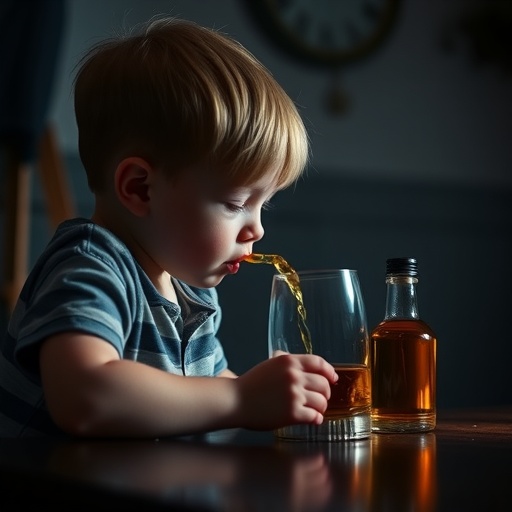In a comprehensive exploration of long-term behavioral patterns, researchers have unveiled significant insights into how childhood experiences shape adult alcohol consumption. The linkage between early life experiences and later substance use has been a focal point in psychological and social research, thereby garnering considerable attention not only from academics but also from public health advocates. A new study titled “Childhood Predictors of Weekly Alcohol Use in Adulthood: A Cross-National Analysis” brings to the forefront critical data that elucidates these connections across different cultures and environments.
The investigation, led by renowned scholars including P.A. de la Rosa, S.J. Jang, and J. Paltzer, utilized a cross-national framework to ensure that the findings are universally applicable rather than culturally constrained. The implications of their work are pivotal, considering that understanding such predictors can help tailor intervention strategies aimed at reducing alcohol misuse in various populations. The researchers gathered their data from multiple countries, thus capturing a diverse range of childhood experiences that can influence adult behavior concerning alcohol use.
With a rise in alcohol-related health issues globally, the research focuses on discerning the specific childhood circumstances that correlate with patterns of weekly alcohol consumption in adulthood. This aspect is particularly crucial, given that early interventions might significantly alter an individual’s trajectory regarding drinking habits. The study highlights numerous factors, such as family dynamics, socio-economic conditions, parental supervision, and peer influences during childhood as crucial determinants influencing adult alcohol behavior.
The research methodology encompassed a robust, multi-dimensional approach. Utilizing both qualitative and quantitative data, the study examined a large sample of individuals who were tracked over the years. This longitudinal aspect provided a more nuanced understanding of how early life influences unfold into adulthood, particularly emphasizing the developmental stages where children are especially susceptible to these influences. By cross-referencing the results across different cultural settings, the researchers underscore the universal themes that transcend geographical boundaries.
An intriguing outcome of the study reveals that parental attitudes towards alcohol significantly impact children’s later drinking behaviors. Families where alcohol is normalized or openly consumed tend to produce offspring with higher rates of alcohol use in their adult lives. Conversely, families that foster a culture of moderation and responsible drinking tend to see lower instances of alcohol-related problems in their children. This dynamic sheds light on the importance of parenting styles and family values in shaping future generations’ drinking habits.
Peer influence is another critical element emerging from the findings. In childhood and adolescence, the need for social acceptance intensifies, making young individuals susceptible to engaging in harmful behaviors, including excessive drinking. The study confirms that children who associate with peer groups that promote heavy drinking are more likely to carry those tendencies into adulthood. Understanding these dynamics can inform targeted preventive strategies designed to mitigate the risks associated with peer pressure around alcohol consumption.
Furthermore, the study links socio-economic variables, including household income and parental education levels, to adult alcohol use. Data suggests that children from lower socio-economic backgrounds are at a heightened risk for developing problematic drinking behaviors. This correlation paves the way for further investigation into how economic stability, or lack thereof, can factor into the broader discussion of public health and alcohol use. Implementing supportive policies and community resources may help offset these challenges for at-risk populations.
Education emerges as a powerful tool in altering the landscape of alcohol consumption. The researchers advocate for educational programs that not only highlight the risks associated with alcohol use but also foster healthy coping mechanisms for stress and social situations. Schools can play a vital role in shaping children’s perspectives on alcohol and equipping them with the knowledge necessary to make informed choices.
The implications of the study extend beyond individual behaviors to societal health. By identifying specific childhood predictors, public health organizations can develop more effective intervention programs tailored to specific demographics. Given the scope and depth of this research, policymakers and community leaders are encouraged to consider these findings in crafting initiatives that aim to reduce alcohol dependence and promote general well-being in various communities globally.
One key takeaway from the study is the potential for resilience against alcohol use in adulthood, which may stem from more positive childhood experiences. These may include strong familial support, student engagement in healthy activities, and the presence of role models who exemplify responsible behaviors. Remarkably, fostering such influences may be a viable approach toward resilience-building in youths, steering them away from alcohol-related issues as they transition into adulthood.
As the researchers disseminate their findings through various academic and public channels, the hope is to stimulate wider discourse around developmental psychology and public health. The complexity of alcoholic behaviors is multifaceted, requiring comprehensive strategies and community efforts to untangle the threads woven by childhood experiences that lead to adult patterns of consumption. The overarching goal remains clear: to decrease the prevalence of alcohol-related harm through informed interventions based on this critical research.
In conclusion, the work of de la Rosa, Jang, and Paltzer stands as a vital contribution to the field of child and family studies, illuminating a path toward a healthier future. With their findings, there lies an opportunity to shift paradigms surrounding alcohol use, fostering environments in which children can thrive without the looming shadow of substance misuse. As this research prompts further examination and discussion, it also heralds a renewed commitment to preventive frameworks that can nurture healthier generations.
Subject of Research: Childhood Predictors of Adult Alcohol Use
Article Title: Childhood Predictors of Weekly Alcohol Use in Adulthood: A Cross-National Analysis
Article References:
de la Rosa, P.A., Jang, S.J., Paltzer, J. et al. Childhood Predictors of Weekly Alcohol Use in Adulthood: A Cross-National Analysis. J Child Fam Stud (2025). https://doi.org/10.1007/s10826-025-03126-8
Image Credits: AI Generated
DOI:
Keywords: Childhood predictors, adult alcohol use, cross-national analysis, parental influence, peer pressure, socio-economic factors.




